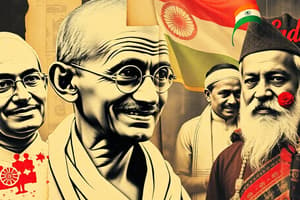Podcast
Questions and Answers
Why did Mahatma Gandhi call off the Non-Cooperation Movement in February 1922?
Why did Mahatma Gandhi call off the Non-Cooperation Movement in February 1922?
- Following the death of twentytwo policemen in a peaceful demonstration.
- Due to violent activities carried out by a crowd of peasants in Chauri Chaura. (correct)
- Because the British government threatened to take severe action against the movement.
- As a result of pressure from other Congress leaders like Motilal Nehru.
What strategy did some other Congress leaders like Chitta Ranjan Das and Motilal Nehru advocate for after the Non-Cooperation Movement?
What strategy did some other Congress leaders like Chitta Ranjan Das and Motilal Nehru advocate for after the Non-Cooperation Movement?
- Advocating for complete independence from British rule.
- Continuing with mass agitations across the country.
- Boycotting all government activities.
- Participating in elections to influence government policies. (correct)
What impact did the Gandhians' sincere social work in villages in the mid-1920s have?
What impact did the Gandhians' sincere social work in villages in the mid-1920s have?
- It extended their support base, which was useful for launching the Civil Disobedience Movement. (correct)
- It led to significant gains in urban areas rather than rural regions.
- It resulted in conflicts with other nationalist groups.
- It caused a split within the Congress party.
Which two significant political parties were formed in the mid-1920s as mentioned in the text?
Which two significant political parties were formed in the mid-1920s as mentioned in the text?
What role did Bhagat Singh play during this period as mentioned in the text?
What role did Bhagat Singh play during this period as mentioned in the text?
What was the literal meaning of 'sarvajanik' in the name 'Poona Sarvajanik Sabha'?
What was the literal meaning of 'sarvajanik' in the name 'Poona Sarvajanik Sabha'?
What was a key feature of the Indian National Congress' goals?
What was a key feature of the Indian National Congress' goals?
What Act disallowed Indians from possessing arms in 1878?
What Act disallowed Indians from possessing arms in 1878?
What was the purpose of the Vernacular Press Act enacted in 1878?
What was the purpose of the Vernacular Press Act enacted in 1878?
What did the political associations formed after 1850 aim to represent?
What did the political associations formed after 1850 aim to represent?
Who were the leaders of most of the political associations formed in the 1870s and 1880s?
Who were the leaders of most of the political associations formed in the 1870s and 1880s?
What intensified the dissatisfaction with British rule in the 1870s and 1880s?
What intensified the dissatisfaction with British rule in the 1870s and 1880s?
What idea did the political associations work with regarding the people of India?
What idea did the political associations work with regarding the people of India?
What was the literal meaning of 'sarvajanik' in the name 'Poona Sarvajanik Sabha'?
What was the literal meaning of 'sarvajanik' in the name 'Poona Sarvajanik Sabha'?
What were the goals of the political associations in India regarding decision-making power?
What were the goals of the political associations in India regarding decision-making power?
Flashcards are hidden until you start studying




